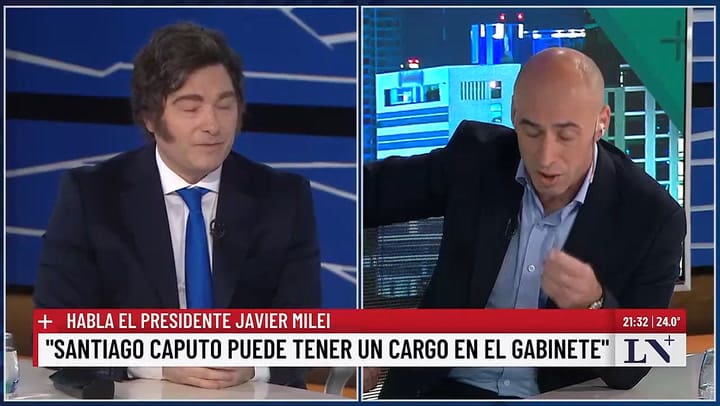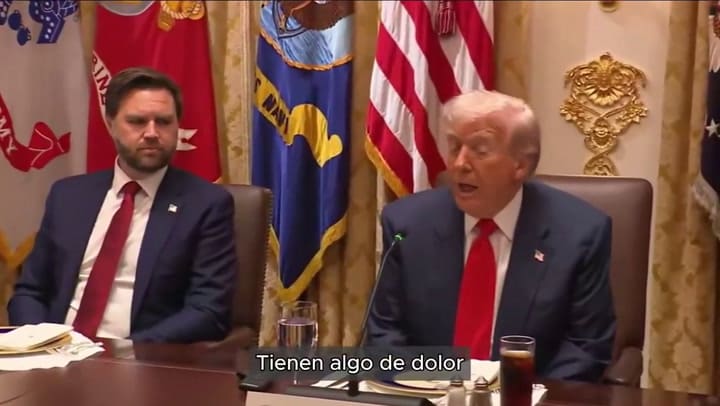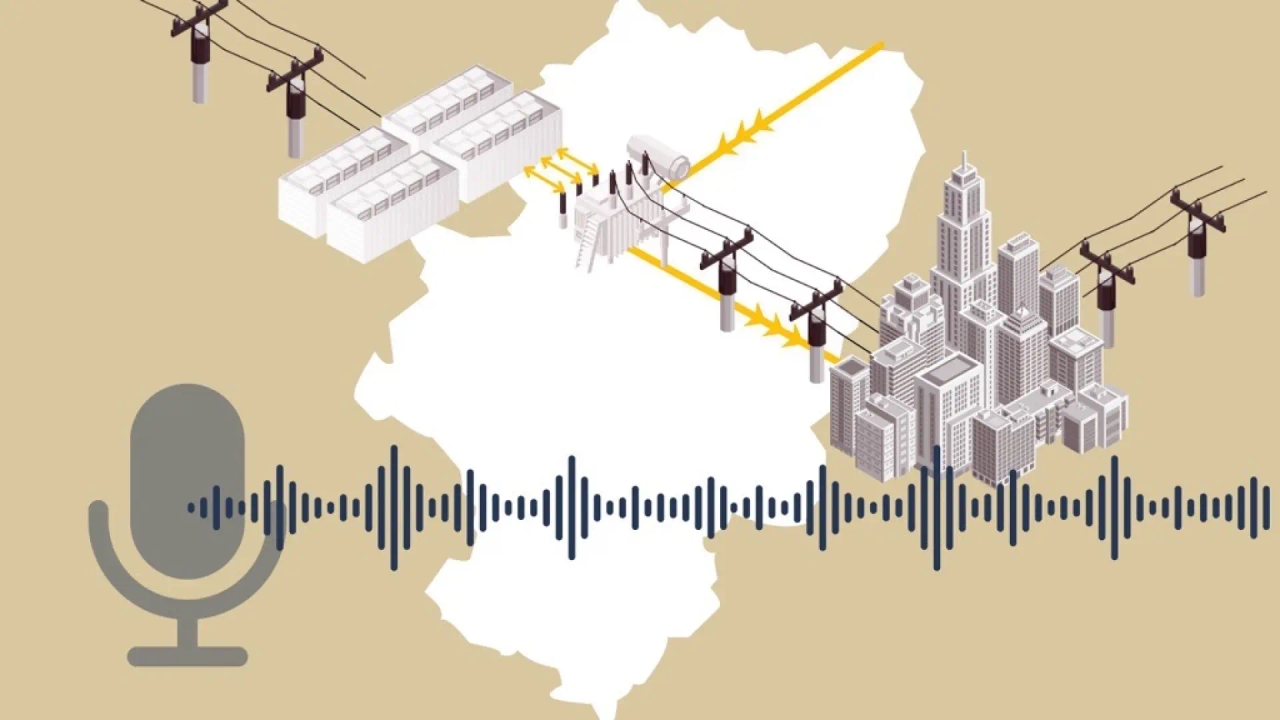The path that leads to the end of the libertarian utopia

Javier Milei leaps from vertigo to daydreaming. In a single conversation, he warns of the danger of voting against his government next week and promises that Argentina will be the richest country in the world within a few years. Donald Trump agrees with the former. If he also believed the latter, he might never have approved the financial aid that saved his Southern Cone protégé from disaster.
“It’s not that big a country. It’s not going to make much of a difference to us,” Trump said Tuesday, with natural disdain, when he theorized about a possible failure of the Argentine bailout. “It could fail,” he conceded. Milei listened in silence, a spectator at his own bilateral meeting in the White House .
His visit to Washington proved to be phenomenal ego therapy, but it also marked a moment of revelation that made clear what's at stake in next Sunday's legislative elections . The forces that have been mobilized to assist him demand that he win, articulate a reformist political alliance, and establish a government capable of managing the resulting changes.
Milei must rebuild, from a position of urgency and under external surveillance , the coalition he had in place a year ago , which he undermined with insults and broken promises.
His disdain for the hands he'd rushed to offer after his 2023 triumph responded to an idealistic logic: he only accepted, in the heat of his newfound power, those who embraced the libertarian utopia. Milei saw himself as a prophet who came to free Argentina from the restrictions that politics had imposed on market mechanisms. His ultimate mission was to abolish the state and unleash the power of private enterprise once and for all. Those circumstantial allies were responsible for the preceding ruin. From the "degenerate prosecutors" who govern the provinces to the "lukewarm" and "moderate" members of the Pro (Progressive Party), the party founded by Mauricio Macri . All of them "kukas," rats, or accomplices, affected by "mental parasites."
He achieved a fiscal surplus and promoted a large number of deregulations (more than his team seems capable of managing). But contrary to dogma, he maintained state intervention in a key market: the monetary market. His firm determination to maintain a cheap dollar and thus accelerate the decline in inflation—the great driver of his popularity—led him into the trap from which he is struggling to escape today. He did, in his own way, what all previous governments had done: admitting seemingly temporary inconsistencies to improve his electoral performance, in the hope that later, yes, with guaranteed popular support, he could finally do "the right thing."

Gasoline—in the form of dollars—ran out prematurely.
The consensual project he now clings to implies the end of the libertarian dream and a commitment to a period of moderate change. With pro-market measures, but also with public works. In which the chainsaw as a symbol of insensitive austerity measures is replaced by a peso-by-peso discussion with the governors who promoted emergency disability laws, the pension increase, and the automatic distribution of assistance funds to the provinces.
The existential transformation this implies for Milei is compounded by the need to reorganize her team, which has been severely strained by the internal conflicts that arose during the days when she declared herself the leader of the "best government in history." When she suggested on Thursday that advisor Santiago Caputo could join the Cabinet with a formal position, internal tensions accelerated.
Potential allies are watching the spectacle without even knowing who will call them to negotiate. A possible empowerment by Caputo would leave Guillermo Francos , the Chief of Staff, and his protégé Lisandro Catalán , Minister of the Interior, wounded (or even excluded). The Menem cousins, Karina Milei 's squires, are also entrenched in resistance. The vacant posts in the Security and Defense departments loom as disputed treasures. Foreign Minister Gerardo Werthein appears to be the target of Caputo's crosshairs, sharpened by his informal contacts in Trump's Washington.
The President seems the only one in a position to put together a puzzle that seems designed for inefficiency.
But his energy is focused on touring the country as a joint candidate on a list generally populated by names with no electoral appeal. Along the way, he faces rivals among those he needs to woo for the upcoming campaign.
Of the country's 24 governors, 19 are facing La Libertad Avanza (LLA) at the polls. All of them hope to win in their provinces so they can negotiate from a position of strength. "There won't be an automatic coalition like the one Milei is selling. They're the ones who need us now," says one of the members of Provincias Unidas, a multi-party alliance that emerged out of the defensive need of a group of governors affected by the austerity measures and the hostility of the Casa Rosada (Presidential Palace).
Macri, whose party is running alongside LLA in most districts, set conditions for an agreement. He called for dialogue "with humility and honesty" and stated that the budget discussion should guide the course of governance. Santiago Caputo responded with a reminiscent of better times: "Argentina needs a new reformist majority to push through Congress the fundamental changes that President Milei is spearheading."
Leaders listening to the siren calls of the Casa Rosada hope to first learn a number that will be revealed on Sunday the 26th: what percentage of social support Milei and her program retain after these turbulent months. The incentives to come close to talking depend largely on how close the party reaches 40%, the threshold that allows us to imagine a government in the hypothetical reelection zone. At 35% or higher, the government has a good chance of being the most voted-for force in the country and recreating reformist expectations. Below that figure, it enters a zone of darkness.
Trump understood. He may not have known at some point whether his friend Milei was facing a presidential or a legislative election, but he grasped the sense of urgency: they came to him to take exceptional measures because it was a matter of life or death. "If he loses, we're leaving," he said at the White House on Tuesday, sending shivers through the Argentine delegation. Old Donald never stopped feeling like the host of The Apprentice .

The government's reaction resembled panic. First, it attempted the childish exegesis of a man who speaks without restraint. Ministers and the President himself lined up to clarify that Trump was talking about 2027 , not next Sunday. A message on social media from the American leader left them hanging. "I hope the Argentine people understand your excellent work and support you during the upcoming midterm elections so we can continue helping you achieve Argentina's incredible potential," he wrote. What happens if the people don't support you, then?
Milei accused the TN journalist who consulted Trump about the elections of being a malicious operator. "Does the United States' support for Argentina depend on the outcome of the upcoming legislative elections and the government's ability to pass long-term reforms in Congress?" was the question, which didn't include a single adjective. The disdain for professional journalism survives in the new consensual Milei.
Trump's pressure also spread to Treasury Secretary Scott Bessent , who seemed to quickly realize that making aid conditional on the election result would shake up the markets. But his wise resolve not to snub his boss weighed heavily on him: "A return to the failed policies of Peronism would prompt a rethinking of the US position ," he stated.
Bessent is making a personal gamble in Argentina that is earning him professional criticism and political denunciations in his home country. At times, he suffers the bewilderment of an imperial general facing the resistance of an untamed tribe . On Friday, he saw stock prices continue to rise after he announced a new intervention by the United States Treasury, now with cash settlement operations.
His tweets, which were like a cannon, seem like a water pistol as he speeds up voting time. Milei rushed to thank him for the pesos he bought and the dollars he poured into the local market. She retweeted the Trumpist secretary's message with an addition: "MAGA!" , the acronym that stands for "Let's Make America (or Argentina) Great Again." A gesture of gratitude or irony? Surely the former. For the latter, he might have written: "Sell, champion, don't miss out."
For the moment, Bessent supports Milei's theory that Argentina's economic program is sound, but it is under political attack from its Peronist opponents, which has caused a liquidity crisis. However, through the International Monetary Fund (IMF) , advice is beginning to arrive for a reformulation after the elections. Kristalina Georgieva is already publicly warning that Argentina needs a consistent policy of accumulating reserves. Could she do so at this exchange rate, which not even the US Treasury can sustain?
The idea that Kirchnerism's actions destabilized the economic program clashes with the evidence that the Union for the Homeland deputies and senators have consistently acted in the same way since Milei took office. The votes that have turned Congress around since the middle of this year are primarily those cast by the governors the Casa Rosada now wants to woo.
If financial instability were solely due to fear of a new Kirchnerist comeback, Milei has an additional problem. Everything indicates that the ticket led by Cristina Kirchner, Axel Kicillof, and Sergio Massa will win again in the province of Buenos Aires on Sunday the 26th. And that national Peronism will be competitive, as the first or second-largest force in the country. The gamble of "putting the final nail in the coffin of Kirchnerism" failed. The dead you kill will be an inevitable presence on the road to 2027.
Trump's words challenge Milei to demonstrate electoral success at all costs. This is revealed by his latest response to the question about what he means by winning: he said it means securing the blocking third in the Chamber of Deputies with his own legislators and allies. It's almost like declaring victory in advance, since even with a poor result, he'll be on the threshold of the necessary 86 seats if you count the Libertarians, the surviving members of the Pro Party, and some regular collaborators. Will the market buy into that interpretation?
The "tercio" (third) is a defensive tool that has served Milei throughout this time to sustain the veto of opposition laws that run counter to her fiscal plan. The reform agenda included in the agreement with creditors requires a return to an offensive momentum similar to the one she displayed when she won the presidency, with a parliamentary minority but driven by the 55% vote in the runoff against Massa.
A Milei who counts seats instead of votes takes another step toward the "caste" he denounces.
Perhaps the transition to political normalcy doesn't leave him many options. The experiment in a libertarian nation will be left for another time. Urgent needs—and Chief Donald—force him to quickly grieve for the lost opportunity and pray that the inhabitants of the system he came to destroy will wait for him with a clean slate.

lanacion





